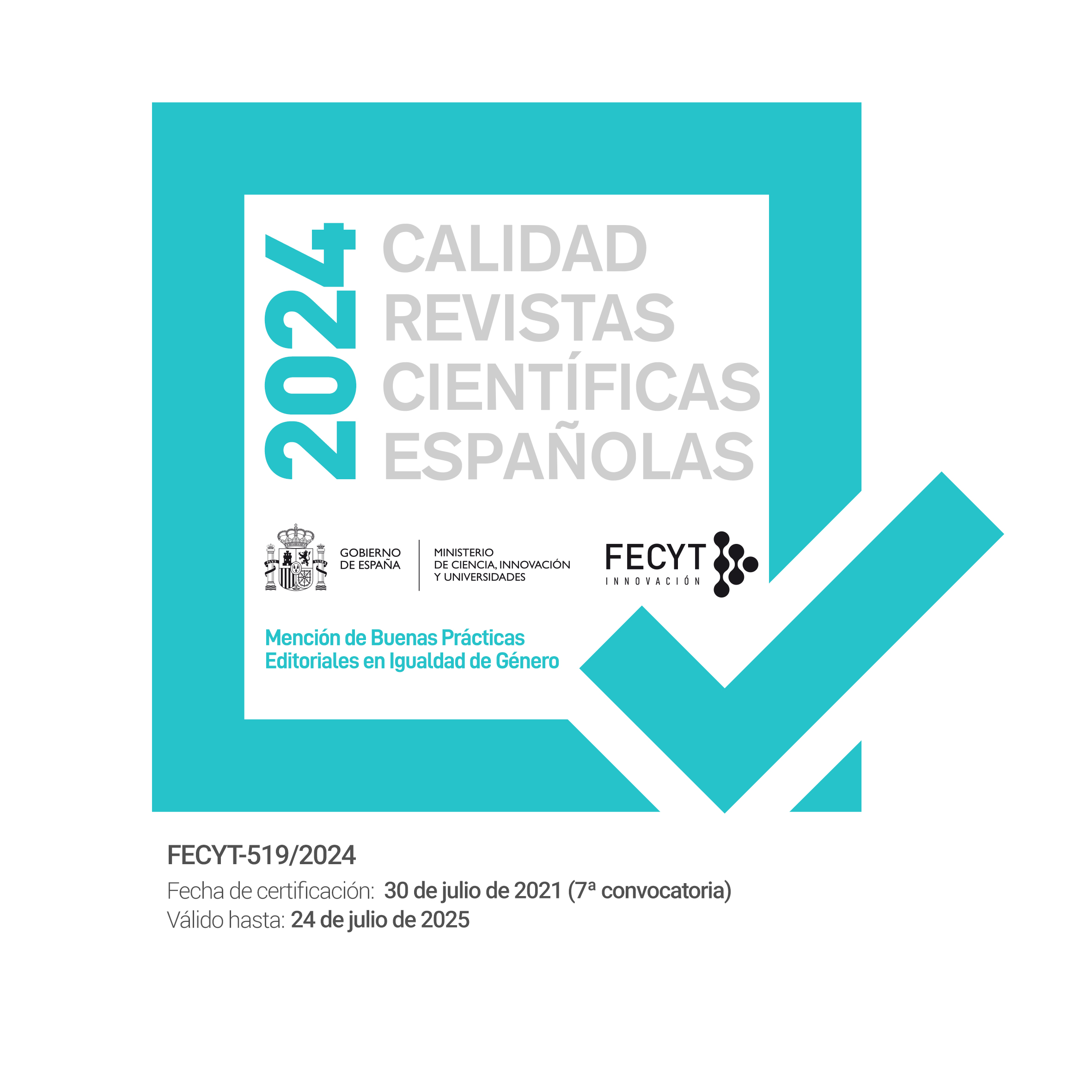Corpora in the Social Sciences – How corpus-based approaches can support qualitative interview analyses
Palabras clave:
qualitative research, corpus analysis, interdisciplinary research, interview analysis, evaluative language, speaker identitiesResumen
Qualitative and quantitative research approaches are often considered as incompatible, and when they are brought together in a study, the analyses often stay within the realm of the same research field. The study at hand aims at combining the two methods from the perspectives of different disciplines and tries to determine to which degree a corpus-based analysis might support the traditional content-focused approach to qualitative data and render additional results.
The basis for this study is a set of interviews taken from a survey in the field of educational science. It has previously been subjected to a qualitative analysis as used in social sciences. By processing the data as a corpus, this study will try to analyse in more detail the language used by the interviewees in terms of word frequencies, typical collocations and pronominal use, putting particular emphasis on the phrasing of criticism and evaluation.
Although these features can be traced relatively clearly when looking at language, they are easily overlooked or lost in an analysis categorising utterances on the basis of content only, as is the case in the given qualitative tradition. A corpus-based analysis of the data can therefore be said to give not only interesting but relevant insight into the structure of an interview and the information conveyed by the interviewees.
DOI: 10.20420/rlfe.2015.0011
Descargas
Citas
Ballweg, J. (1995). Allgemeingültige Sätze - Eine Herausforderung für die Prototypensemantik. In G. Harras (Ed.), Die Ordnung der Wörter (pp. 271-88). Berlin: de Gruyter.
Biber, D., S. Johansson, G. Leech, S. Conrad & E. Finegan. (1999). Longman grammar of spoken and written English. Harlow: Longman.
Brannen, J. (2010). Working Qualitatively and Quantitatively. In C. Seale, G. Gobo, J. F. Gubrium, & D. Silverman (Eds.), Qualitative research practice (pp. 282-296). Los Angeles: Sage.
Dedoose Version 5.0.11. (2014). Web application for managing, analyzing, and presenting qualitative and mixed method research data. Los Angeles, CA: SocioCultural Research Consultants, LLC. [12/09/14].
Diekmann, A. (2008). Empirische Sozialforschung: Grundlagen, Methoden, Anwendungen. Reinbek: Rowohlt.
Drew, P. (2004). Integrating qualitative analysis of evaluative discourse with the quantitative approach of corpus linguistics. In G. de Lungo Camiciotti & E. Tognini-Bonelli (Eds.), Academic discourse: New insights into evaluation (pp. 217-229). Bern: Peter Lang.
Durik, A., A. Britt, R. Reynolds, & Storey, J. (2008). The effects of hedges in persuasive arguments: A nuanced analysis of language. Journal of Language and Social Psychology, 27, 217-234.
Evert, S. & Hardie, A. (2011). Twenty-first century corpus workbench: Updating a query architecture for the new millennium. Proceedings of the Corpus Linguistics 2011 Conference. University of Birmingham, UK.
Fest, J. (2011). A corpus-based analysis of register features in British football journalism. Unpublished MA-Thesis, Applied Linguistics, RWTH Aachen University.
Giele, J. Z. (2009). Life stories to understand diversity: Variations by class, race, and gender. In G. H. Elder & J. Z. Giele (Eds.), The craft of life course research (pp. 236-257). New York: The Guilford Press.
Hunston, S. (2007). Using a corpus to investigate stance quantitatively and qualitatively. In R. Englebretson (Ed.), Stancetaking in discourse (pp. 27-48). Amsterdam: John Benjamins.
Kirschbaum, I. (2002). Schrecklich nett und voll verrückt: Muster der Adjektiv-Intensivierung im Deutschen. Düsseldorf: Heinrich-Heine-Universität.
Kjellmer, G. (2003). A modal shock absorber, empathiser/emphasiser and qualifier. IJCL, 8, 145-168.
Mayring, P. (2010). Qualitative Inhaltsanalyse. Grundlagen und Techniken. 11th ed. Weinheim: Beltz.
Ministry of Innovation, Higher Education and Research of North Rhine-Westphalia. (2012). StudiFinder - Welches Studium passt zu mir? [29/06/14].
Mortelmans, T. (2003). The ‘subjective’ effects of negation and past subjunctive on deontic modals. The case of German 'dürfen' and 'sollen'. In F. Lenz (Ed.), Deictic conceptualisation of space, time and person (pp. 153-182). Amsterdam: John Benjamins.
Neumann, S. (2013). Contrastive register variation. A quantitative approach to the comparison of English and German. Berlin: de Gruyter.
O'Halloran, K. (2011). Investigating argumentation in reading groups: Combining manual qualitative coding and automated corpus analysis tools. Applied Linguistics, 32, 172-196.
Rosenthal, G. (2010). Biographical research. In C. Seale, G. Gobo, J. F. Gubrium, and D. Silverman (Eds.), Qualitative research practice (pp. 48-64). Los Angeles: Sage.
van de Mieroop, D. (2005). An integrated approach of quantitative and qualitative analysis in the study of identity in speeches. Discourse & Society, 16, 107-130.
Waitzkin, H. (1993). Interpretive analysis of spoken discourse: Dealing with the limitations of quantitative and qualitative methods. Southern Communication Journal, 58, 128-146.
Wermke, M., K. Kunkel-Razum, & Scholze-Stubenrecht, W. (Eds.). (2009). Duden (Vol. 4) (8th ed.). Mannheim: Dudenverlag.
Wottawa, H. & S. Drees. (2012). Schritt für Schritt zum passenden Studium. Der ‘StudiFinder‘ als Online-Hilfe in der Schule. Schule NRW, 12, 615-617.
Zifonun, G. (2000). ‘Man lebt nur einmal.' Morphosyntax und Semantik des Pronomens 'man'. Deutsche Sprache, 28, 232-253.
Descargas
Publicado
Cómo citar
Número
Sección
Licencia
Aquellos autores/as que tengan publicaciones con esta revista, aceptan los términos siguientes:
- Los autores/as conservarán sus derechos de autor y garantizarán a la revista el derecho de primera publicación de su obra, el cuál estará simultáneamente sujeto a la Licencia de reconocimiento de Creative Commons que permite a terceros compartir la obra siempre que se indique su autor y su primera publicación esta revista.
- Los autores/as podrán adoptar otros acuerdos de licencia no exclusiva de distribución de la versión de la obra publicada (p. ej.: depositarla en un archivo telemático institucional o publicarla en un volumen monográfico) siempre que se indique la publicación inicial en esta revista.
- Se permite y recomienda a los autores/as difundir su obra a través de Internet (p. ej.: en archivos telemáticos institucionales o en su página web) antes y durante el proceso de envío, lo cual puede producir intercambios interesantes y aumentar las citas de la obra publicada. (Véase El efecto del acceso abierto).

Revista de Lenguas para fines específicos is licensed under a Creative Commons Reconocimiento-NoComercial-SinObraDerivada 4.0 Internacional License.























